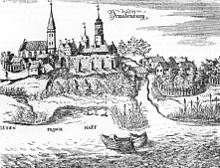Lischke (settlement)
In the time of the Teutonic Order, a Lischke was understood to be an irregular settlement. The name comes from the Prussian word "liscis" , which means something like camp.
Emergence
They were mostly craft settlements with occasional markets. These Prussian settlements had city-like structures and were geographically convenient so that they often developed into a city. On the other hand, they only existed under the protection of an order castle until it was no longer used. So it is said on the East Prussian side about the history of the place Labiau , " the Lischke, a settlement of jugs, fishermen, craftsmen and gardeners in front of the castle, existed as early as the 13th century ".
Further meaning
Lischke was also the name of the often embroidered carrying basket, which was made of bast or willow branches. It was a piece of rural folk art. (" Lischke, a basket woven out of bast, which is carried on a rope, like a travel bag, around the armpit .")
literature
- Max Toeppen: About Prussian Lischken, towns and cities. A contribution to the history of the municipal constitutions in Prussia . Old Prussian Monthly Journal, Vol. 4. Königsberg 1867, pp. 511–536 ( full text ), pp. 621–646 ( full text ).
- Herbert Ludat: Preliminary stages and development of the urban system in Eastern Europe. Cologne-Braunsfeld 1955
- Constance working group for medieval history: the beginnings of the rural community and its essence. Verlag J. Thorbecke, 1986, ISBN 3799566074
Individual evidence
- ^ Rolf Siemon: Lischke
- ↑ Lischke (Kreisgemeinschaft Labiau) ( Memento of the original from October 17, 2008 in the Internet Archive ) Info: The archive link was inserted automatically and has not yet been checked. Please check the original and archive link according to the instructions and then remove this notice.
- ↑ Korb-Lischke (zeno.org) In: Karl Friedrich Wilhelm Wander (Hrsg.): Deutsches Sprich emphasis-Lexikon. Volume 2, Leipzig 1870, column 563, no.640

